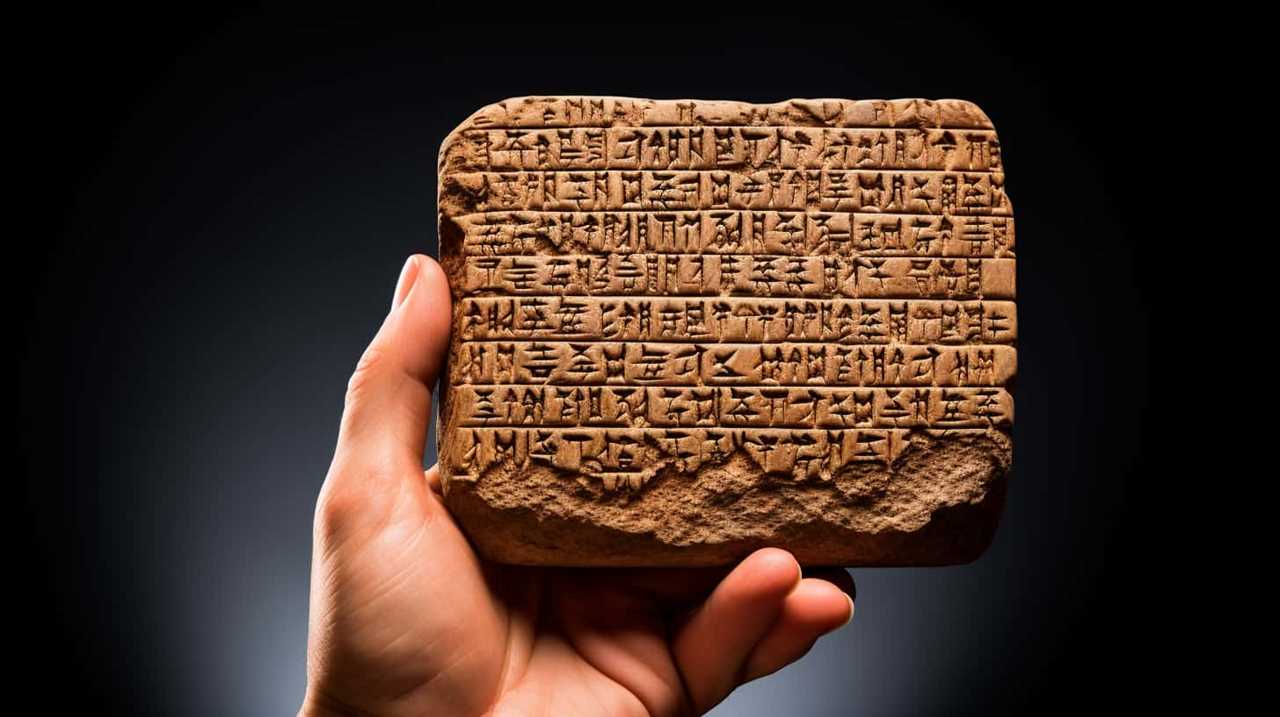Have you ever thought about why Confucius placed such importance on respect within the family? In a world where personal interests often take precedence over everything else, this idea may seem outdated or unimportant.
However, understanding Confucius’s teachings on the importance of family respect is crucial for gaining mastery in the realm of ethics and morality. Confucius believed that family was the foundation of a harmonious society, and that respect and reverence for one’s parents and elders was the key to cultivating virtuous character.
In this introduction, we will explore Confucius’s teachings on filial piety, parent-child relationships, and the role of family in moral development. By delving into these ancient wisdoms, we can uncover the timeless significance of family respect in shaping our personal and societal values.
Key Takeaways
- Family is considered the foundation of society in Confucianism.
- Filial piety, the duty and respect children owe their parents, is seen as a cornerstone of ethical behavior and fosters harmony within the family.
- Confucius believed that practicing filial piety brings virtues into wider society and shapes individual behavior and societal values.
- Confucius emphasized the importance of strong parent-child relationships and maintaining family harmony as essential for social order.
The Importance of Family in Confucianism
The centrality of family within Confucianism lies in its emphasis on filial piety, the profound reverence and devotion towards one’s parents and ancestors. Confucianism places great importance on the family unit as the foundation of society and the key to maintaining social harmony. In Confucian teachings, family is seen as the primary source of moral values, with filial piety serving as the cornerstone of ethical behavior.

Confucianism and gender roles are deeply intertwined within the context of family. Traditional Confucian values emphasize the submission of women to men and their roles as wives and mothers. Women are expected to be obedient and serve their husbands and families dutifully. This patriarchal view of gender roles, although challenged in modern times, still influences societal norms in many East Asian cultures influenced by Confucianism.
Another aspect of the importance of family in Confucianism is the idea of family harmony. Confucius taught that maintaining harmonious relationships within the family was essential for social stability. This involves a hierarchy of authority, where parents are respected and obeyed by their children, and children show gratitude and care towards their parents. Through filial piety and the cultivation of family harmony, Confucianism seeks to create a well-ordered society where individuals fulfill their roles and responsibilities within the family structure.
Confucius’s Teachings on Filial Piety
Confucius’s teachings on filial piety emphasize the importance of family as the moral foundation of society. Filial piety, or the duty and respect children owe their parents, is seen as a fundamental virtue in Confucianism. It serves as a model for cultivating moral character, fostering harmony within the family, and promoting social order.
These teachings highlight the significance of familial relationships and the role they play in shaping individual behavior and societal values.

Family as Moral Foundation
In our exploration of Confucius’s teachings on filial piety, we acknowledge the significance of family as a moral foundation. Family, according to Confucius, plays a crucial role in shaping an individual’s character and moral values. Here are three key reasons why family is seen as a moral foundation in Confucianism:
- Gender Equality: Confucius emphasized the importance of treating all family members with respect and equality, regardless of their gender. This challenged traditional patriarchal norms and promoted a more egalitarian society.
- Generational Conflicts: Confucius recognized the potential for conflicts between generations and believed that a strong family bond could help resolve these conflicts. Through filial piety, younger generations learn to respect and obey their elders, fostering harmony within the family unit.
- Moral Development: The family serves as a microcosm of society, providing individuals with an environment to cultivate moral virtues such as kindness, honesty, and fairness. Confucius believed that by practicing filial piety within the family, individuals would develop these virtues and bring them into the wider society.
Understanding the importance of family as a moral foundation sets the stage for exploring the role of filial piety in Confucian teachings.
Role of Filial Piety
Continuing our exploration of filial piety as a moral foundation in Confucianism, we understand the role it plays in shaping individuals’ character and fostering harmony within the family unit. Filial piety, known as xiao in Chinese, refers to the virtuous behavior of respecting and caring for one’s parents and ancestors. It is considered one of the fundamental principles of Confucianism and holds significant importance in Chinese society. The table below highlights the key aspects of filial piety and its impact on societal harmony:
| Significance of Filial Piety in Confucianism | Impact of Filial Piety on Societal Harmony |
|---|---|
| Upholds moral values and social order | Promotes strong family ties and unity |
| Cultivates virtues such as respect and gratitude | Fosters a harmonious and stable society |
| Strengthens the bond between generations | Enhances social cohesion and cooperation |
Understanding the significance of filial piety in Confucianism helps us appreciate its impact on fostering societal harmony. Now, let’s delve into Confucius’s views on parent-child relationships.

Confucius’s Views on Parent-Child Relationships
Confucius emphasized the importance of filial piety and the role of parental guidance in shaping the parent-child relationship. He believed that children should respect and obey their parents, while parents should provide guidance and nurture their children.
Confucius believed that strong parent-child relationships were essential for fostering harmonious families and maintaining social order.
Importance of Filial Piety
As we explore the importance of filial piety, we can understand Confucius’s views on parent-child relationships. Filial piety, or the respect and obedience children owe to their parents, was a central concept in Confucianism. Confucius believed that maintaining strong parent-child relationships was essential for a harmonious society. Here are three key aspects of Confucius’s views on parent-child relationships:
- Ancestor worship: Confucius emphasized the importance of honoring one’s ancestors as a way to show respect for the family lineage and to maintain family unity.
- Sibling relationships: Confucius believed that sibling relationships should be characterized by mutual respect and support, as siblings were seen as extensions of the parent-child relationship.
- Moral education: Confucius stressed the role of parents in guiding their children’s moral development and cultivating virtues such as filial piety, loyalty, and righteousness.
Understanding these aspects of Confucius’s views on parent-child relationships helps us appreciate the significance of filial piety and the role it plays in shaping Chinese society.

Now, let’s transition into the subsequent section about the role of parental guidance.
Role of Parental Guidance
Building on the importance of filial piety, we recognize the vital role parental guidance plays in shaping the parent-child relationships emphasized by Confucius. Confucius believed that parents should serve as role models and provide guidance to their children in order to cultivate virtue and moral character.
He emphasized the importance of respecting and obeying parents, as they were seen as the primary source of wisdom and knowledge. Confucius believed that a harmonious family dynamic, fostered by parental guidance, would lead to a well-ordered society.
Through their teachings and example, parents were expected to instill values such as loyalty, filial piety, and respect for authority in their children. Confucius believed that the impact of family dynamics, influenced by parental guidance, would ultimately shape the character and behavior of individuals, and by extension, society as a whole.

The Role of Family in Moral Development
Our family’s influence plays a crucial role in shaping our moral development. The values and principles we learn from our families set the foundation for our understanding of right and wrong. Here are three ways in which the family plays a significant role in moral development:
- Modeling Behavior: Children learn by observing their parents and other family members. They internalize the behaviors and attitudes they see in their family, which then shape their own moral compass. For example, in Chinese society, gender roles are often deeply ingrained within the family structure. Children learn about traditional gender roles by observing how their parents and older siblings interact and behave.
- Teaching Values: Families are responsible for instilling core values in their children. Through direct instruction and guidance, parents teach their children about honesty, compassion, respect, and other moral virtues. These values become internalized and guide individuals’ moral decision-making throughout their lives.
- Providing Emotional Support: Family support is essential for moral development. When children feel loved, accepted, and supported by their family, they develop a strong sense of self-worth and empathy towards others. This emotional foundation helps them make moral choices based on empathy and compassion rather than self-interest.
Understanding the crucial role of the family in moral development, it’s clear why Confucius emphasized the importance of family respect. Now, let’s explore Confucius’ views on sibling relationships.
Confucius on Sibling Relationships
When examining Confucius’ teachings on sibling relationships, we can observe the importance he placed on the bonds between brothers and sisters. According to Confucius, siblings have the potential to foster mutual respect and support, which in turn contributes to the overall harmony and stability of the family unit.
Importance of Sibling Bonds
Strengthening sibling bonds plays a crucial role in Confucius’ emphasis on family respect. Sibling bonding is highly valued in Confucian philosophy, as it cultivates important virtues and contributes to the overall harmony and well-being of the family unit.

Confucius believed that siblings should support and care for each other, fostering a sense of unity and solidarity within the family.
Here are three reasons why sibling bonds are important according to Confucius:
- Sibling relationships provide emotional support and companionship, creating a sense of belonging and security within the family.
- Siblings learn important social skills, such as cooperation, compromise, and conflict resolution, through their interactions with each other.
- Strong sibling bonds can help preserve family traditions and values, as siblings can pass down cultural knowledge and practices to future generations.
Confucius’ Teachings on Siblings
In Confucius’ teachings, we learn about the importance of sibling relationships and how they contribute to the overall harmony and well-being of the family.
Confucius recognized that sibling relationships could sometimes be marred by rivalry and conflict, and he offered guidance on how to navigate these challenges. He believed that siblings should prioritize mutual respect and understanding, rather than engaging in competition or jealousy.

Confucius emphasized the importance of communication and resolving conflicts through open dialogue. He advised siblings to practice empathy, to put themselves in each other’s shoes, and to seek peaceful resolutions.
By promoting harmony among siblings, Confucius believed that the family unit would be strengthened, leading to a more harmonious society as a whole.
With this understanding, let’s now explore the benefits of sibling respect and how it contributes to the overall well-being of the family.
Benefits of Sibling Respect
We greatly appreciate the significance of sibling respect in Confucius’ teachings, as it fosters unity and harmony within the family. Sibling relationships hold several benefits, which are essential for fostering sibling harmony:

- Mutual support: Siblings who respect each other provide a strong support system for one another. They can lean on each other in times of need and share their joys and sorrows, creating a sense of emotional security within the family.
- Character development: By respecting their siblings, individuals learn important values such as patience, empathy, and compromise. These qualities contribute to their personal growth and help them become better members of society.
- Lifelong bond: Sibling relationships, built on respect, can last a lifetime. When siblings respect and appreciate each other, they form a deep bond that withstands the test of time, providing them with a lifelong source of companionship and support.
Fostering sibling respect within the family is essential for nurturing strong and harmonious relationships, as emphasized by Confucius.
The Influence of Ancestor Worship in Confucianism
One significant aspect of Confucianism is the extensive practice of ancestor worship. Ancestor worship holds great influence on Confucian values and plays a pivotal role in the religion. It is believed that honoring and revering one’s ancestors strengthens family ties and promotes harmony within society.
Confucianism places a strong emphasis on the importance of family and filial piety, which is the respect and devotion shown to one’s parents and ancestors. This is deeply rooted in the practice of ancestor worship. By paying homage to their ancestors, individuals not only express gratitude for the sacrifices made by their forefathers but also seek their blessings and guidance in various aspects of life.
The influence of ancestor worship on Confucian values can be seen in the role of family rituals in Confucianism. These rituals, such as ancestral veneration ceremonies and tomb-sweeping rituals, are performed to maintain the connection between the living and the deceased. They serve as a means of communication with ancestors and a way to ensure their continued presence and influence in the lives of their descendants.

In Confucianism, family rituals are considered essential for the cultivation of moral character and the preservation of social order. They serve as a reminder of one’s responsibilities towards their ancestors and reinforce the values of filial piety, respect, and gratitude. Through the practice of ancestor worship, Confucianism seeks to foster a sense of continuity, harmony, and reverence within families and society as a whole.
| Influence of Ancestor Worship on Confucian Values | Role of Family Rituals in Confucianism |
|---|---|
| Strengthens family ties | Maintains connection with ancestors |
| Promotes harmony within society | Ensures continued presence and influence of ancestors |
| Cultivates moral character | Reinforces values of filial piety, respect, and gratitude |
| Fosters continuity and reverence | Preserves social order |
Confucius’s Advice on Maintaining Harmony Within the Family
To understand Confucius’s advice on maintaining harmony within the family, it’s important to consider his teachings on the role of mutual respect and communication. Confucius believed that a harmonious family was the foundation of a harmonious society. He emphasized the importance of mutual respect within the family, as it forms the basis for healthy relationships and effective communication.
Confucius’s teachings on family harmony can be summarized as follows:
- Respect for elders: Confucius emphasized the importance of respecting and honoring one’s parents and elders. He believed that filial piety, or the respect for one’s parents and ancestors, was a fundamental virtue that should be cultivated within the family.
- Balanced relationships: Confucius stressed the need for maintaining harmonious relationships within the family through the practice of the five cardinal relationships – between ruler and subject, husband and wife, parent and child, older sibling and younger sibling, and friend and friend. These relationships should be based on mutual respect and understanding.
- Open and honest communication: Confucius believed that open and honest communication was essential for maintaining harmony within the family. He encouraged family members to express their thoughts and feelings respectfully, and to listen attentively to one another.
Confucius’s teachings on family harmony highlight the importance of mutual respect and communication within the family unit. By cultivating these virtues, individuals can foster harmonious relationships and contribute to a peaceful and prosperous society.

Confucius’s Critique of Neglecting Family Duties
Confucius’s critique of neglecting family duties arises from his belief that the family serves as the foundation of society. He emphasizes the importance of fulfilling one’s duties and obligations within the family, as this contributes to the overall harmony and stability of society.
Confucius particularly stresses the concept of filial piety, which involves showing respect and obedience towards one’s parents and ancestors, as a key aspect of fulfilling family obligations.
Through his critique, Confucius highlights the detrimental effects of neglecting these duties, as it can lead to disharmony and disrupt the proper functioning of society.
Family as Foundation
We frequently prioritize our individual desires and ambitions over fulfilling our familial responsibilities, which undermines the foundation of the family, as Confucius critiques. In today’s society, where gender equality and modern challenges shape our perceptions of family, it’s crucial to examine the significance of the family as a foundation.

- Family provides emotional support and stability, fostering a sense of belonging and identity.
- It serves as a source of socialization, teaching values, ethics, and cultural traditions.
- The family unit plays a vital role in shaping an individual’s character, behavior, and moral compass.
Neglecting family duties not only weakens the bond within the family but also has far-reaching consequences for society. By recognizing the importance of the family as the bedrock of society, we can begin to understand our duties and obligations towards our loved ones.
Transitioning into the subsequent section about ‘duties and obligations,’ it becomes clear that Confucius believed that upholding these responsibilities was essential for a harmonious society.
Duties and Obligations
In fulfilling our duties and obligations, we mustn’t overlook the importance that Confucius placed on showing respect to our families. Confucius believed that the family is the foundation of society, and it’s within the family that one learns the values and principles that shape their character.
Therefore, it’s essential for individuals to fulfill their parental responsibilities and maintain family harmony. Confucius emphasized the importance of filial piety, which includes respecting and obeying one’s parents, caring for them in their old age, and continuing the family lineage. Neglecting these duties and obligations was seen as a violation of the natural order and a threat to social stability.

Importance of Filial Piety
Confucius emphasized the importance of filial piety and criticized the neglect of family duties and obligations. According to him, neglecting these responsibilities can have significant consequences, both for individuals and society as a whole. Here are some key points to consider:
- Role of obedience: Confucius believed that obedience to one’s parents and ancestors was crucial for maintaining social harmony and order. Neglecting family duties would disrupt this harmony and lead to societal unrest.
- Cultural implications: Filial piety was deeply ingrained in Chinese culture, and Confucius saw it as the foundation of moral and ethical values. Neglecting family duties would erode these values and undermine the fabric of society.
- Personal development: Confucius believed that fulfilling family obligations was essential for personal growth and moral development. Neglecting these duties would hinder one’s own progress and character development.
Understanding the importance of filial piety and fulfilling family duties is vital for individuals seeking mastery in Confucian teachings. It not only ensures personal growth but also contributes to the stability and well-being of society.
Confucius’s Perspective on the Family as the Foundation of Society
From Confucius’s viewpoint, the family serves as the bedrock upon which society is built. Confucius believed that a harmonious family is the key to maintaining social order and stability. His teachings on gender roles within the family emphasized the importance of each family member fulfilling their respective duties and responsibilities. Confucius’s legacy in shaping Chinese family values can be seen in the emphasis on filial piety, respect for elders, and the hierarchical structure of the family. To illustrate this further, let’s take a look at the following table:
| Gender Roles in the Confucian Family | Duties and Responsibilities |
|---|---|
| Men | Provide for the family and uphold moral standards |
| Women | Nurture the family and maintain harmony |
| Children | Respect and obey their parents |
This table highlights the division of roles within the Confucian family, with men being responsible for the external affairs and women taking care of the internal affairs. Children are expected to respect and obey their parents, ensuring the continuation of family values and traditions. Confucius believed that when each family member fulfills their roles, it contributes to the overall harmony and stability of society.

Confucian Values and the Preservation of Family Traditions
Continuing our exploration of Confucius’s emphasis on family respect, we delve into the significance of Confucian values in preserving family traditions. Confucianism places great importance on the preservation of cultural heritage, particularly within the context of the family. This emphasis stems from the belief that family traditions serve as a foundation for moral values and social order.
Confucian principles in modern society continue to play a crucial role in maintaining and passing down family traditions. Here are three reasons why the preservation of family traditions is essential:
- Cultural Identity: Family traditions help individuals connect with their cultural heritage, fostering a sense of belonging and identity.
- Continuity: Preserving family traditions ensures their continuity across generations, allowing individuals to maintain a strong connection to their past.
- Values Transmission: Family traditions serve as a vehicle for transmitting Confucian values, such as respect, filial piety, and harmony, from one generation to another.
By upholding these values and traditions, Confucianism contributes to the preservation of cultural heritage and fosters a sense of unity within families. This not only strengthens the family unit but also promotes social stability and harmony in broader society.
As we explore Confucius’s guidance on balancing individual and family interests, it’s important to understand the significance of family traditions in shaping our understanding of these principles.

Confucius’s Guidance on Balancing Individual and Family Interests
Confucius guides us in balancing individual and family interests by emphasizing the importance of mutual support and cooperation within the family unit. Balancing individual interests with the well-being of the family is essential for achieving family harmony. Confucius believed that each individual has a responsibility to contribute to the welfare of the family, and in doing so, they can also fulfill their own personal goals and aspirations.
Confucius recognized that individuals have their own desires and ambitions, which can sometimes conflict with the needs and expectations of the family. However, he emphasized the importance of finding a balance between these interests. This balance can be achieved through open communication, understanding, and compromise within the family. By prioritizing the harmony of the family unit, individuals can find fulfillment and happiness in their own lives as well.
In Confucianism, family harmony is considered crucial for the well-being of society as a whole. When individuals prioritize the interests of the family over their own, it strengthens the bonds between family members and promotes a sense of unity and cooperation. This not only benefits the family but also contributes to a harmonious and stable society.
As we delve deeper into Confucian teachings, it becomes evident that family rituals hold great significance in maintaining family harmony.

The Significance of Family Rituals in Confucianism
Family rituals play a crucial role in maintaining family harmony, fostering a sense of unity, and reinforcing the values and teachings of Confucianism. These rituals hold great significance within the Confucian belief system, particularly in relation to the concept of filial piety.
The significance of family rituals can be understood through the following points:
- Preservation of Traditions: Family rituals serve as a means of preserving cultural traditions and customs, allowing for the transmission of cultural values and practices from one generation to the next. Through the performance of these rituals, individuals learn about their heritage and develop a sense of identity and belonging.
- Reinforcement of Filial Piety: Filial piety, the respect and devotion towards one’s parents and ancestors, is a central virtue in Confucianism. Family rituals provide a platform for the expression of filial piety, as they often involve paying respects to ancestors and elders. By participating in these rituals, individuals demonstrate their reverence and gratitude towards their family members, strengthening the bonds between generations.
- Creation of Family Unity: Family rituals provide opportunities for family members to come together, fostering a sense of unity and cohesion. These rituals often involve shared activities, such as meals or ceremonies, which promote communication, understanding, and mutual support among family members. Through these shared experiences, family members develop a sense of collective identity and solidarity.
Confucius’s Teachings on Gender Roles Within the Family
In our exploration of the significance of family rituals in Confucianism, it’s important to delve into Confucius’s teachings on gender roles within the family. Confucius’s perspective on family hierarchy played a crucial role in shaping his teachings on gender roles.
According to Confucius, the family served as the foundation of society, with each member having specific duties and responsibilities based on their gender. Confucius believed in the concept of filial piety, which emphasized respect and obedience towards one’s parents and ancestors. This principle extended to the relationship between husbands and wives within the family.

Confucius taught that husbands should fulfill their role as the head of the household, providing for and protecting their families. In turn, wives were expected to be obedient and supportive, taking care of the household and raising the children.
Confucius’s teachings also emphasized the importance of maintaining harmony within the family. He believed that fulfilling one’s role within the family hierarchy was essential for creating a harmonious society. Confucius taught that by upholding their respective gender roles, family members could contribute to the overall stability and prosperity of the community.
It is important to note that Confucius’s teachings on gender roles were reflective of the social norms and values of his time. While his teachings may be seen as patriarchal by modern standards, they were intended to promote order and harmony within society.
Understanding Confucius’s perspective on gender roles is crucial for comprehending the significance of family respect in Confucianism.

Confucius’s Legacy in Shaping Chinese Family Values
As we delve into the legacy of Confucius in shaping Chinese family values, it’s important to recognize how his teachings on gender roles influenced societal norms and expectations. Confucianism’s impact on Chinese culture can’t be understated, especially when it comes to the values placed on family and filial piety. Confucius believed that the family was the bedrock of society, and that showing respect and obedience to one’s parents and ancestors was of utmost importance. This belief shaped the way Chinese families functioned and interacted with one another.
Confucianism’s cultural influence on Chinese family values can be seen in the following ways:
- Filial piety: Confucius emphasized the importance of children respecting and caring for their parents. This notion of filial piety ingrained a sense of duty and responsibility towards the family, leading to strong family bonds.
- Patriarchy: Confucius believed in the hierarchical structure of the family, with the father as the head and decision-maker. This patriarchal system influenced the roles and expectations of family members, particularly women, within the household.
- Ancestral worship: Confucianism placed great importance on honoring and remembering one’s ancestors. This practice fostered a sense of continuity and reverence for the past, strengthening family ties and promoting a collective identity.
Frequently Asked Questions
How Did Confucius View the Relationship Between Parents and Children?
Confucius emphasized family respect because he believed in the importance of filial piety and maintaining harmony in society. His teachings on family hierarchy stressed the duties and responsibilities of parents and children in building a strong moral foundation.
What Role Does Ancestor Worship Play in Confucianism?
The role of ancestor worship in Confucianism is significant. Rituals honoring ancestors were believed to maintain harmony within the family and society, reinforcing Confucius’ emphasis on family respect and filial piety.

What Advice Did Confucius Give on Maintaining Harmony Within the Family?
Confucius emphasized family respect because he believed it was essential for maintaining harmony within the family. His advice on maintaining harmony included practicing filial piety, honoring ancestors, and following the principles of benevolence and righteousness.
How Did Confucius Critique Neglecting Family Duties?
Confucius critiqued neglecting family duties by emphasizing the importance of family loyalty. He believed that maintaining strong family bonds was crucial for harmony in society and that respect for one’s family was a fundamental virtue.
How Did Confucius Shape Chinese Family Values Through His Teachings?
Confucius’ teachings on filial piety greatly influenced Chinese family values. His emphasis on respecting and obeying one’s parents shaped the importance placed on family relationships. Additionally, his teachings reinforced traditional gender roles within the family structure.
What Are Some Examples of Confucian Quotes Emphasizing Family Respect?
Confucian quotes on family respect emphasize the importance of filial piety and harmony within the family. For example, “The strength of a nation derives from the integrity of the home” stresses the impact of familial relationships on the broader society. Another quote, “Respect yourself and others will respect you,” emphasizes the mutual respect necessary within the family unit.
Conclusion
In conclusion, Confucius’s emphasis on family respect in Confucianism is rooted in his belief that strong familial bonds are essential for moral development and societal harmony.

Through his teachings on filial piety, parent-child relationships, sibling relationships, and the importance of family rituals, Confucius sought to establish a framework for maintaining balance between individual and family interests.
His legacy in shaping Chinese family values continues to influence the cultural fabric of China today.
Fritz is a writer whose humor and wit infuse life into words. His creativity, combined with a profound love for the English language, makes him a unique voice at afterQuotes. Fritz’s engagement with books, culture, and social media adds depth to his contributions, making them resonate with our diverse audience.










